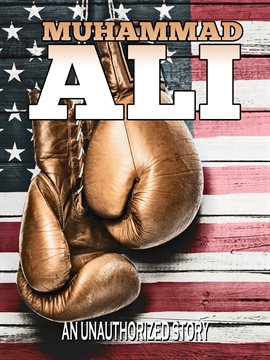
eVideo
hoopla Instant
Muhammad Ali
Year
2010
Language
ENGLISH
Duration
51m
Rating
NR
CC
Publication Information
Shami Media Group
Summary
Muhammad Ali the boxer was also an Olympic Gold medalist and the first to win the linear heavyweight title three times. Muhammad Ali the star was a jive-talking showman who had reporters eating out of his hands, always wondering what he was going to say next. Muhammad Ali the humanitarian gave cause to his countrymen to find their place in the world. Ali grew up in Louisville Kentucky as Cassius Clay Jnr, and started boxing at an early age. Working on his fitness he'd run beside the school bus rather than catch it, and spar under an old cedar tree in his front yard. He took up boxing so that he would be ready if he ever caught up with the thieves who stole a treasured bicycle. But boxing became so much more to him than just a way to get revenge or defend himself. During his amateur career he registered 100 wins and five losses, competed in the famous Golden Gloves tournament, and finally as an amateur in the 1960 Olympic games before turning pro. The opponent of his first professional fight remembers Ali (then known by his real name, Clay) as being lightening fast, and delivering the hardest body blow he'd ever taken. By March 1963 Ali had won each of his 18 bouts, with five knockouts, and nine technical knockouts. He was also building a reputation as the "Louisville Lip", with his confident assurance becoming as much a trademark as his footwork and punches. Ali's first title fight was against Sonny Liston, on Feb 25th, 1964 in Miami Beach. Ali won, becoming the heavyweight champion of the world, and retained his title the following year. In March of '64 he celebrated his joining the Fellowship of Islam by changing his name to Muhammad Ali. In 1966 Ali became a conscientious objector to the war in Vietnam, refusing to fight due to his religious beliefs, and taking his personal battle to court. After some time in Europe, Ali returned to the US in November '66 and continued to object to taking up arms in Vietnam. During this time, paradoxically, he retained his WBC title, and won the WBA title in two bouts that demonstrated his superb skill and "ruthless killer instinct". Ali won his court battle in the end, but also won in the court of public opinion, in a time where anti-war protests were the in-thing. Toward the end of the '70's boxing was losing its grip on the American public and many of Ali's former opponents had retired. By now, Ali was firmly established as a cultural phenomenon, his views on politics, fate, society and life sought by the media and public. It's hard to think of another athlete that so many have looked to, in such a way. Ali retired in June, 1979, but was coaxed out of retirement in 1980 to contest the WBC title, and that was when the first rumblings that something was seriously wrong with the greatest boxer in history, took hold. He was examined at the Mao Clinic and diagnosed with Parkinson's disease in 1983. Since retiring he has worked endlessly for various humanitarian causes, including the search for a cure for Parkinson's sufferers.